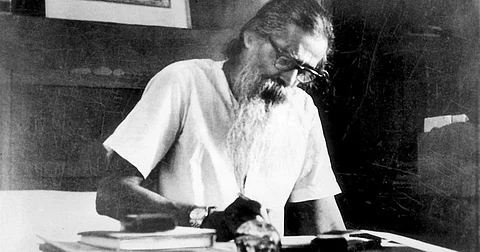

Recently, Kerala Chief Minister Pinarayi Vijayan wrote a letter to the Union Health Minister Dr Harsh Vardhan, asking him to reconsider the decision of naming the new campus of the Rajiv Gandhi Centre for Biotechnology after M S Golwalkar and instead name it after an Indian scientist of International repute.
The decision was met with a lot of opposition from the Congress too. MP and former union minister Shashi Tharoor asked in a series of tweets whether the Centre wanted to "memorialise a bigoted Hitler-admirer, who in a 1966 speech to the VHP, asserted the supremacy of religion over science?" He continued, "As for Rajiv Gandhi's contribution, he inspired scientific innovation & allocated funds for it."
Who exactly was Golwalker and what is the reason behind the controversy? We decided to have a look at it. The second chief of the Rashtriya Swayamsevak Sangh (RSS), Madhav Sadashiv Golwalkar is considered to be one of the key people responsible for spreading the RSS ideology in the country. He was a professor of Zoology at the Banaras Hindu University.
History would remember Golwalker for being arrested, along with around 20,000 swayamsevaks in February 1948, after Mahatma Gandhi's assassination. Since Nathuram Godse was part of the RSS, there was widespread apprehension about the organisation's involvement in the assassination. However, Godse had later said that he "acted on his own initiative". Following the incident, the RSS was banned in the country for inciting violence. The ban was later lifted after Golwalkar promised his loyalty to the Indian Constitution.
Ramachandra Guha, in his book Makers of Modern India, had mentioned that Golwalkar has been known to see Muslims, Christians and communists as three principal threats to the formation of a Hindu nation. He equated them to demons and according to him, the Hindus were avenging angels who would destroy them to bring back the good.
Golwalkar is also believed to have spoken up against the caste system. He had passed a resolution titled Hindavaha sadoraha, na Hindu patito bhavet (All Hindus are born out of the same womb (of Mother India)) and was apparently against untouchability.
The increasing opposition against naming the institute after him was however defended by the ruling BJP. "What is wrong in naming an institute after a patriot?" asked Union Minister V Muraleedharan. While he said that Golwalkar was a Zoology professor in BHU, he asked in retaliation why the famous Nehru Trophy Boat Race was named after former Prime Minister Jawaharlal Nehru.
